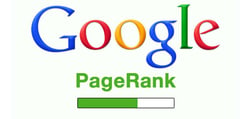Index Content
You probably know the terms positioning, SEO, optimisation, etc. You are probably a bit lost with the difference between off-page SEO and on-page SEO. Do you feel the same? Let's tell you the differences then.
what is SEO?
Before differentiating between on page SEO and off page SEO, let's take a look at what SEO is.
SEO is nothing more than a series of content optimisation strategies that aim to improve our position in search engines for certain search terms, with the aim of increasing traffic to our website.
Therefore, the strategies we use to position our website will be SEO techniques that will not only direct more traffic to our website, but also improve other features. Some of these features may be: improving the design of our website to make it more attractive to the user, improving the keywords we use to refer to our content on the web, etc. In short, SEO positioning offers our website many advantages that go beyond finding us in the first position when someone searches for terms related to our website on Google.
However, depending on the SEO factors we are going to work on, we can talk about two types of SEO: off page and on page. Each of them is responsible for covering specific characteristics.
- On-page SEO: This is in charge of covering the factors that affect the positioning of our website in Google and that we can correct internally from our own brand. Some of these aspects could be, as we have already mentioned above: the loading speed of our main page, the level of optimisation of the images, if there are a large number of duplicated or repeated elements, etc. In other words, the on-page SEO analysis, as its name suggests, is about knowing the factors that are affecting internally and on which we can act directly.
- Off-page SEO: This aspect is about discovering which aspects influence the positioning of our website externally. That is to say, which aspects are affecting our website positively or negatively. For example, having a high number of negative reviews will mean that our content will not be shown at the top of the search results. Or, on the contrary, if our website is being linked many times with quality content, our positioning on the Internet will be favoured and will influence the authority with which our website is seen on the Internet.
Differences between off page SEO and on page SEO
We have gone a bit into the differences between SEO off page and SEO on page but I imagine you will like to know what each of them is responsible for in depth. Let's see it!
SEO OFFPAGE
As we have just mentioned, off-page seo is the task of knowing what external factors influence the positioning of our website and working on it consists of applying a series of strategies and techniques that help us to get external links pointing to our website. As we have already mentioned, if we have a high number of external links that lead traffic to our website and it is also quality traffic, success in SEO positioning is assured.
Off-page SEO is linked to the Page Rank of a web browser such as Google. The Page Rank is a score that Google assigns to all the web pages that it shows when a search is performed and that is updated and modified from time to time. This score that Google assigns is mainly based on links received, total visits to the page and the quality of the site in terms of design, updating, contents, participation, etc.
In other words, Google will value the quality of our page to decide our positioning based on links from other blogs, publications or social networks that link to our website to guide traffic. As Wendy Piersall said at a conference in 2018, "Google will only love you when others love you first" How right she was!
In order to improve our off page SEO and to ensure that our positioning is optimal, there are several actions that, if we carry them out, can end up driving quality traffic to our website.
- Include a blog on our website and update it: If we want other blogs with authority to link to us, we must have a blog on our website in which we publish interesting content related to the field of our company.
- Include content aggregators: Many prestigious platforms for sharing content can help us to distribute our articles through them and thus reach a wider audience. An example of such a platform could be Dotdash.com .
- Know how to take advantage of social networks: Yes, we have said it hundreds of times, but social networks are such a useful and versatile tool that can help us with everything.
- Develop linkbuilding strategies: We have already mentioned that one of the main factors that favour our off-page SEO are links from authority blogs to our website. Therefore, we can create a campaign with them, get in touch and explain to them the mutual benefit for both brands if we link to each other in a reciprocal way, as they would also gain more traffic with our links.
SEO ONPAGE
On the other hand, there is SEO on page. As its name indicates and as we have mentioned before, it deals with those aspects of our website that affect the positioning of our website in Google and that we can correct internally from our own brand.
On Page SEO is fundamental because it contributes to appearing in the first positions of Google and, as you well know, appearing in the first positions of Google implies a large number of visits to your website.
Some of the aspects in which we can work on the SEO on page are:
- Optimise your website: As we have already said, our website will be the showcase that we will have to sell ourselves to users and for them to discover us as a brand. However, if we do not have it optimised, it will not be positioned in Google and this will reduce our visibility and, therefore, business opportunities. Having our website optimised means making the user experience on it as easy as possible, as optimal as possible. Some of the things we can do to make this happen is to control the loading speed of our platform: do not include images or videos that are too heavy and that may hinder the quality of the results.
- Use good keywords: Positioning in Google is also about the keywords we use. Keywords, as their name suggests, are the keywords we use on our page. It is important that in our blog articles, for example, we use terms related to our brand's competencies and to what the user is looking for.
- Create quality content: Being well positioned in Google is a task that requires care and constant work. One day we can be very high in the search results but if we do not take care of our interface and do not create quality content, users will enter but will leave again.
- Add digital content to your website: Related to the above and to creating quality content for our website, a good tool is digital content. If we incorporate videos, images, infographics, etc. on our website, we will make the user's visual experience more attractive and will help them to better understand how our brand and our work works.





